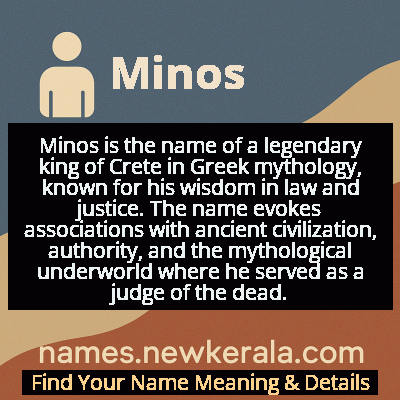Minos Name Meaning & Details
Origin, Popularity, Numerology Analysis & Name Meaning of Minos
Discover the origin, meaning, and cultural significance of the name MINOS. Delve into its historical roots and explore the lasting impact it has had on communities and traditions.
Name
Minos
Gender
Male
Origin
Greek
Lucky Number
7
Meaning of the Name - Minos
Minos is the name of a legendary king of Crete in Greek mythology, known for his wisdom in law and justice. The name evokes associations with ancient civilization, authority, and the mythological underworld where he served as a judge of the dead.
Minos - Complete Numerology Analysis
Your Numerology Number
Based on Pythagorean Numerology System
Ruling Planet
Neptune (Ketu)
Positive Nature
Intuitive, analytical, spiritual, and inquisitive.
Negative Traits
Secretive, reserved, aloof, and can be overly critical.
Lucky Colours
Green, yellow.
Lucky Days
Monday.
Lucky Stones
Cat’s eye, moonstone.
Harmony Numbers
1, 5, 6.
Best Suited Professions
Scientists, researchers, spiritual leaders, detectives.
What People Like About You
Depth of knowledge, analytical skills, spirituality.
Famous People Named Minos
Minos of Crete
Mythological King
Legendary ruler who established Crete's naval empire and created the Labyrinth
Minos Kalokairinos
Archaeologist
First excavator of Knossos in 1878, preceding Arthur Evans' work
Minos Kokkinakis
Religious Figure
Greek Evangelical preacher whose legal case established religious freedom precedents
Minos Kyriakou
Business Magnate
Founder of Antenna Group, one of Greece's largest media conglomerates
Name Variations & International Equivalents
Click on blue names to explore their detailed meanings. Gray names with will be available soon.
Cultural & Historical Significance
The historical significance of Minos extends beyond mythology into archaeology and cultural studies. The term 'Minoan' civilization, coined by Arthur Evans after the legendary king, refers to the Bronze Age civilization of Crete that flourished from approximately 2700 to 1450 BCE. This civilization, characterized by its advanced architecture, art, and writing systems, represents Europe's first major civilization. The name Minos thus bridges mythological narrative and historical reality, embodying the sophisticated culture that predated classical Greece and influenced subsequent Mediterranean civilizations.
Extended Personality Analysis
Individuals named Minos are often perceived as possessing strong leadership qualities, analytical minds, and a natural sense of authority. Drawing from the mythological king's legacy, they tend to exhibit judicial wisdom, strategic thinking, and organizational skills. There's an expectation of fairness and principle-driven decision-making, though this may sometimes manifest as rigidity or inflexibility. The name carries connotations of someone who establishes order and systems, capable of complex planning and long-term vision, much like the legendary king who built the intricate Labyrinth and established Crete as a naval power.
The darker aspects of the mythological Minos also influence personality associations, suggesting potential for stern judgment, occasional ruthlessness in pursuit of goals, and a commanding presence that can intimidate others. However, these traits are typically balanced by the positive aspects of wisdom and justice. Modern bearers of the name might be expected to demonstrate intellectual depth, cultural sophistication, and the ability to navigate complex situations—qualities that reflect both the mythological judge of the dead and the sophisticated Minoan civilization that bears his name.
Modern Usage & Popularity
In contemporary times, Minos remains a relatively rare but culturally significant name, primarily used in Greece and among diaspora communities. It enjoys occasional usage by parents seeking a name with strong classical roots and mythological resonance. The name has seen modest revival in recent decades, particularly among families with interest in classical studies, archaeology, or Greek heritage. While not among the most popular Greek names, it maintains a steady presence and is sometimes chosen for its distinctive character and intellectual connotations. In academic and cultural circles, the name carries prestige due to its association with both mythological grandeur and the groundbreaking Minoan civilization discoveries.
Symbolic & Spiritual Meanings
Minos symbolizes the dual nature of justice and authority—representing both wise judgment and potential tyranny. The name embodies the concept of labyrinthine complexity, reflecting the intricate palace structure and the complicated moral landscape of Greek mythology. It serves as a metaphor for civilization-building, legal systems, and the establishment of order from chaos. Symbolically, Minos connects the mortal and divine realms, representing the intersection of human governance with higher principles. The name also carries connotations of legacy and cultural memory, linking ancient mythological narratives with archaeological discovery and historical continuity across millennia.

